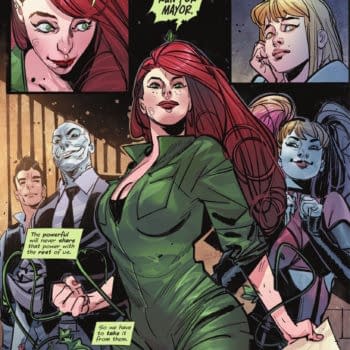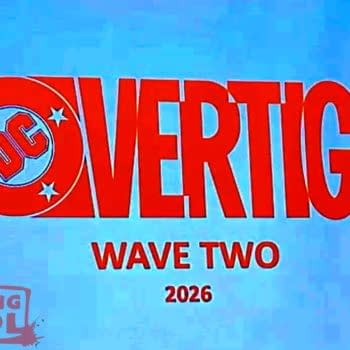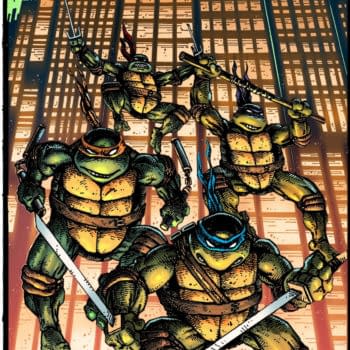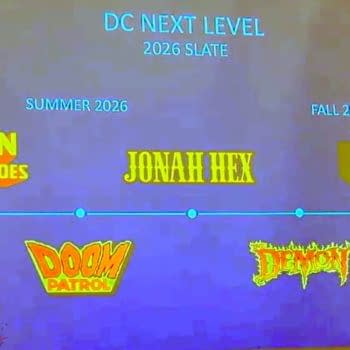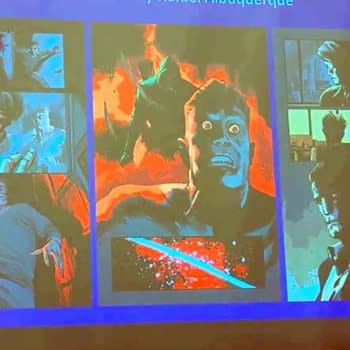Posted in: Comics | Tagged: orson scott card
Should You Be Blacklisted, Mr. Card?
The title of the event went through a few iterations before settling on its final form, using the buzzword "blacklisting", including "Superman vs. Orson Scott Card" along the way. As part of a series of Comic Book Round Table discussions held at the Soho Gallery for Digital Art and orchestrated by former Marvel editor and author Danny Fingeroth and sci-fi writer, editor, and gallery owner John Ordover, it was preceded in the schedule by a rather heated panel on the legacy of Frederic Wertham. The concept behind drawing panellists together this time, however, was particularly original. Ordover observed those who were particularly vociferous on social media among his professional acquaintances and invited them to say in person what they were prepared to say about the Orson Scott Card debacle online. Those who took the plunge were former Star Trek writer David Gerrold, who is both gay and an adoptive father, Joseph Phillip Illidge, a former editor of BATMAN at DC, co-owner of Verge Entertainment, and author of the upcoming First Second graphic novel THE REN about the Harlem Renaissance, and Paul Kupperberg, author of ARCHIE comics and a young adult novel featuring the openly gay character Kevin Keller. They were joined by Adam DeKraker, an artist who has worked with a wide range of publishers including Dark Horse, Marvel, and DC, and currently produces a webcomic featuring gay superheroes, THE YOUNG PROTECTORS, Jeff Trexler, an attorney and writer on the subject of comics and law for The Comics Beat and The Comics Journal, and Danny Fingeroth himself.
Gerrold, live in videocast from his home in California, opened the discussion with a few statements about his reaction to Orson Scott Card's religious and political activism in the context of work on the beloved character (and franchise) Superman. Gerrold felt that "DC has to be considered the premier comic book publisher in the world", though he didn't seek to "denigrate" other companies. Superman, he observed, is one of the most "problematic" characters within the DCU because he is "so super" and "stands for justice". Gerrold declared that Superman has "never denigrated…or judged human beings unless committing some kind of terrible offense against other human beings" and so placing an openly anti-gay writer in the mix with such an iconic hero is a decisive mistake. "Book sales depend on people having a favorable opinion of you", he added, hinting that Card's "tactical error" lay in openly drafting anti-gay manifestos. Though Gerrold doesn't want to instate something so contrary to human rights as "blacklisting", he feels that fans of Superman will speak with their wallets and would have essentially leave Card high and dry anyway, even if he hadn't been taken off the project.
Before opening discussion among the panellists, Ordover reminded the audience that Card was, in fact, hired to produce only a 10 page digital Adventures of Superman story, and this poses a question of exactly how much impact one more short comic by a homophobic writer would have really had on the industry. Despite the relatively minor project under discussion, Kupperberg still speculated that DC "didn't really realize Card's politics" before allowing him to handle such a significant franchise. "Once they realized the problem", he said, "they looked for a way to back out of it as gracefully as possible". He based this on his previous work for DC when he saw much less overt blandishments of sensitive topics. He commented that in over 70 years of Superman's existence, Card was "not the first bigot" to work with the character by any means, but DC have been more successful in keeping a lid on it in the past. Illidge jumped in to agree, stating, "I can back up your statement 100 percent". DC does, however, Illidge said, have gay employees and freelancers, since the company is an environment where "person to person, it doesn't matter, but corporately, it does matter" what a person's politics may be. Fingeroth wondered whether it was not Card's politics, but his "active" status in the public eye as an anti-gay spokesperson that mattered the most. Kupperberg, for his part, wished that DC had just gone ahead and published the story and allowed it to "flop" since that makes a "bigger statement than trying to end a career directly". The panellists moved closer to the gist of the problem posed by the event, whether blacklisting is ever an acceptable mode of operation, when Kupperberg stated, "I don't want anybody saying 'You can't say that'", as an infringement of civil liberties and freedom of speech.
Trexler brought the legal view DC's unsavoury situation when dealing with Card by outlining some of the problems they might face as publishers "keeping somebody off their job for their religious beliefs". He also pointed out that Superman has some clout as a gay icon because of his "fluid identity" when it comes to relationships. Trexler's point turned on the fact that Card was actually working as a freelancer on the Superman story, and so he was not as protected by "state civil rights laws" as an employee. If Card had been a full employee of DC, it would have been against the law to terminate the project based on Card's Mormon-based disapproval of homosexuality. But as is, DC's reaction to Card's views becomes an ethical rather than legal matter. Illidge commented, however, that comic books themselves are "the antithesis of equality" in handling diversity, and DC have carefully controlled who gets to work on Superman books over the years, falling back on "Caucasian heterosexual males" almost exclusively. Illidge asserted that, "DC's historical actions with Superman have been tantamount to blacklisting" anyway, since African Americans, women, lesbians, and transgender people have never been allowed near creative work on Superman.
DeKraker agreed, explaining that DC have done so "passively", and from his own experience with webcomics, he clarified that saying "It's just a 10 page story in digital format" may be misleading. Webcomics usually find their way into print form, he said, and though DC usually pursue a policy that there is "no such thing as bad publicity", they "totally underestimated the backlash" they would face over Card's work on Superman. Trexler proposed that DC would have done better to use their time and resources to hire more diverse employees rather than "blacklisting or firing" Card, but that would have meant a "prolonged conversation" rather than the speedy silencing of chatter on the topic that they desired. The panel agreed that Card was working on Iron Man before his 2004 "manifesto", "Homosexual marriage in America", but that Iron Man, for all his appeal (especially post films) doesn't have the same stature as Superman for DC's purposes. In pondering why there was less outcry about Card's projects in the past, DeKraker commented wittily, "Never underestimate the power of a slow news day", hitting on the major possibility that the Card furore simply occurred at the right moment to garner extreme reactions from fans via media outlets.
Several of the panellists saw an underlying weakness at work in corporate comics these days that may have contributed to the problem, the hiring of corporate employees coming over from other fields of business who don't fully understand the ins and outs of comics. "The corporate level has undermined the editorial level", Fingeroth said, suggesting that an editor with enough power over the projects under his jurisdiction would have handled the matter differently, and perhaps would not have hired Card in the first place.
Trexler brought a historical vantage to the situation by reminding the audience of the traditionally "outsider" status of comics as a medium that has devolved into what Illidge described as "white male demographic conformity", though Illidge also felt that at one time DC led the way as a "progressive publisher" in the 60s. Diversity is "cosmetic" now, he said, at DC, with a lesbian Batwoman which DC would never hire a lesbian woman to write. Kupperberg argued with this point by stating that though he is not gay, he writes about a gay teenage boy, Kevin Keller, since he feels he is "old enough and has lived enough" to project a "reasonable facsimile" of what that experience must be like, concluding that, as a writer, "That's what we do".
During the question and answer session, the audience posed more direct questions on the subject of blacklisting and its dangers. Censorship, one member pointed out, is the purview of the government whereas blacklisting requires organization and enough power to prevent the blacklisted subject from being hired in the future. Fingeroth's perspective was that "People are not stupid enough to write it down now, but there is blacklisting". Illidge concurred that, in his experience, the conversational style of a blacklist discussion at a major publisher takes the form of saying, for instance, "We don't blacklist anybody, but…. (insert name here)", followed by reasons for firing certain employees. Kupperberg said that a common phrase he'd encountered in the field was "Don't ever use that guy again".
Under pressure from the audience, most of the panellists clarified that they are against blacklisting, personally, but all for boycotting from readers. I asked the panellists a "moment of truth" question, posing a situation wherein they, as editors, were down to the wire, and had to choose between scripts for a project, one of which was by Orson Scott Card. Knowing Card's politics, but needing his better script, would they hire him? Kupperberg was very direct in his answer: "I'd go to second best. I don't work with people I don't like on that level". Fingeroth said that the situation had an extra layer of complexity, clarifying: "There's no easy answer. If we're talking about a situation where I had hired someone–let's get away from Card specifically–to write something, they turned in acceptable work, I and paid them for it, and then before the story was drawn, they publicly expressed an opinion I found reprehensible, I would probably kill the story and refuse to comment to the press, but not demand any return of the payment". Fingeroth's editorial view sounded very similar to DC's response, though they had let the project proceed to the stage of drawing before killing it. Illidge's answer was also in-depth and conveyed a great deal of his knowledge about corporate procedure at DC: "That's a risky scenario if the other two scripts suck", he said, "since it would be my duty as a DC officer to maintain quality. An individual should speak to their superiors about the problem to deflect it first, even if you are philosophically opposed to hiring".
The evening concluded with a final word from the panellists to sum up their view of the Card situation. "I'm done", said Kupperberg, having made his position clear. "He's a dick", DeKraker said calmly. Trexler enigmatically focused on "strategy", meaning perhaps that DC needs clearer modes of embracing diversity in the future. Illidge left the subject with the reader's "choice". None openly suggested that blacklisting of Card should be condoned, relying on a sense that fans will sink that ship themselves by making an economic statement about their feelings on the subject. But, if the suspicions of some of the panellists are correct, the unspoken or unwritten blacklist may still endure, and if there is such a thing as "bad press" for DC, they may find plenty of reasons, none of them officially labelled "blacklisting", for quietly backing away from working with Orson Scott Card in the future.













